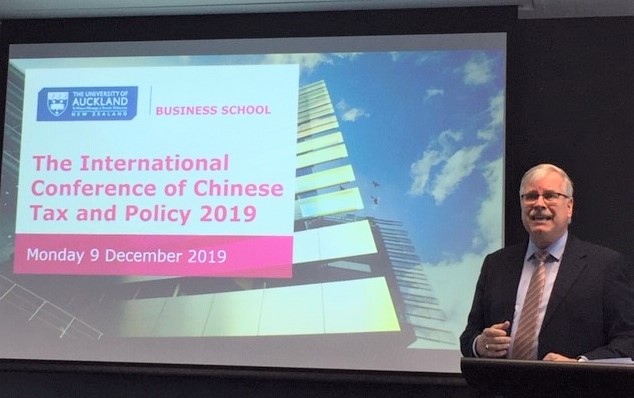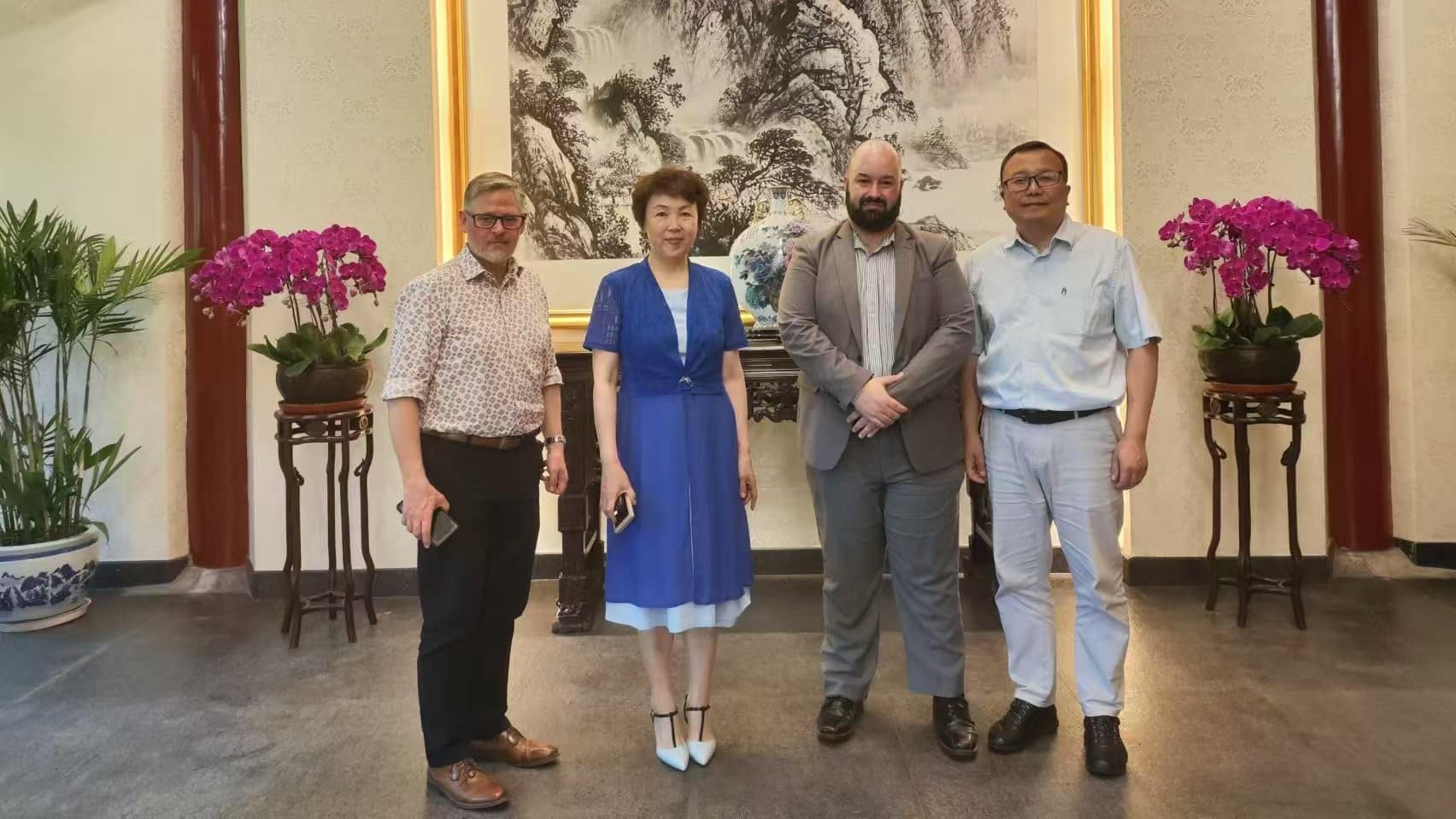“WHAT’S AHEAD FOR NZ/CHINA RELATIONS”
ADDRESS TO THE INTERNATIONAL CONFERENCE OF CHINESE TAX AND POLICY
AUCKLAND, 9 DECEMBER 2019
STEPHEN JACOBI
EXECUTIVE DIRECTOR
NEW ZEALAND CHINA COUNCIL
It’s good to be with you today and I am grateful to Professor Julie Cassidy for the invitation to speak about the future of New Zealand/China relations.
I congratulate all those associated with the planning of this ground-breaking conference and I extend a warm welcome to our Chinese friends visiting New Zealand.
I would, at any time, have been honoured to join you but I am especially glad to do so today.
In a few weeks’ time I finish my role as Executive Director of the NZ China Council, after four years or so, to take on some new challenges.
This conference gives me the opportunity to convey my final thoughts about the relationship – a sort of farewell dispatch if you like.
I’d like to talk about where the relationship has got to today, where it might head in the future and the importance of strong legal frameworks for all this.
The NZ China relationship
When, back in September 1973, those first New Zealand diplomats walked across the border – yes, walked – between Hong Kong and the People’s Republic of China, to begin their long train journey to Beijing to open the New Zealand Embassy, they could not have imagined how this relationship might develop.
From small beginnings both countries have now developed a “Comprehensive Strategic Partnership” which has guided the relationship in recent years.
Many of you will be aware that China and New Zealand have pioneered a series of historic “firsts”, including a ground-breaking free trade agreement which entered in to force 2008.
A few weeks ago New Zealand and China upgraded the free trade agreement, with a package of agreements to further streamline trade and investment and to take account of recent developments, particularly in the areas of services trade, e-commerce and a growing interest in making sure trade and the environment work better together.
This is very good news and shows that our two governments are focused on continuing to enhance the relationship.
Trade was almost non-existent in 1973 and only a third of its current size in 2008: today, China is New Zealand’s largest trading partner and (after Australia) our second largest source of investment.
In China we are increasingly well known as a reliable supplier of safe, sustainable and nutritious food products and other high quality goods and services.
Chinese investors have found in New Zealand profitable business opportunities which are contributing to economic growth and development in our country, including in the regions.
But this relationship is not just about business.
The significant flow of Chinese tourists, students and immigrants to New Zealand is enriching our society with talent and diversity and helping build mutual understanding day by day.
This understanding is vital, given that our two countries are different in so many ways -certainly in size and scale but also historically, culturally and, definitely, politically.
China and New Zealand will not see eye to eye on some important things, but, as Prime Minister Jacinda Ardern said in her first official visit to Beijing last April, this should not stop us working together where it makes sense to do so.
There are some in New Zealand today who argue that we are becoming too dependent economically on China.
It is true that our businesses need a wide range of partners, which is why we actively pursue other trade initiatives such as the Trans Pacific Partnership (TPP) or the Regional Comprehensive Economic Partnership (RCEP).
My view is that the real risk to the relationship is that we focus so much on the economic side that we under-invest in other important areas – I’ll have more to say about this in a moment.
This is the context in which the NZ China Council works to advance New Zealand interests in the relationship and build strong and resilient connections between our two countries.
The Council was established seven years ago as body supported by, but independent, of the Government and our activities are aimed at stimulating discussion and dialogue, providing information and advocacy and bringing together key people in the relationship on both sides.
That is why we very much welcome this initiative on the part of the University of Auckland and the NZ Centre for Law and Business, working with the University of Sydney Business School and The School of Economics at Xiamen Business School.
I am delighted to see on your agenda matters related to the Belt and Road Initiative (BRI).
You will know already that BRI is aimed at achieving development-led growth along ancient trade routes linking China across Eurasia to Europe, as well as more modern trade routes including from China across the South Pacific to New Zealand and on to South America.
What is not so well known is how a distant nation like New Zealand can co-operate with this initiative and how it can add value to New Zealand’s relationship with China and other countries along the Belt and Road.
In May last year, the NZ China Council launched a significant report – “The Belt and Road Initiative: A Strategic Pathway”.
In March 2017, the two governments signed a non-binding Memorandum of Arrangement (MoA) under which the two countries undertook to explore ways of working together in relation to BRI.
We look forward in due course to the announcement of a future work programme between the two countries, but we haven’t waited for this to start the process of reflection in New Zealand.
It is in the area of connectivity that the Council believes BRI could provide a significant opportunity for New Zealand.
Our report identifies a number of initiatives that can be further developed in a BRI framework.
These include:
- trade facilitation
- New Zealand as a conduit to South America
- the creative sector; and
- innovation.
Rather than build the Belt and Road through physical infrastructure, we can help goods, services, capital and people move more easily along the Belt and Road.
Trade facilitation projects could leverage New Zealand’s world class biosecurity regime, expertise in cross border movement of goods, and experience in working across jurisdictions in supply chain hubs.
New Zealand’s geographic location and existing trade and tourism relationships with China and South America position us well as a natural connection or conduit between the two – we call this concept the Southern Link and we explored it in a major conference in June of this year with colleagues from Argentina, Chile and China.
For the creative sector, opportunities exist to use our creative strengths in web solutions, gaming and other properties to expand people to people links, cultural awareness, understanding and exchange.
In the innovation space, New Zealand can utilise its strong capability in science and technology and advance our existing collaboration and promote greater commercialisation of ideas.
These are just a few ideas that we believe could be developed further by the public and private sectors to boost our co-operation under BRI and contribute to its goals of development-led growth.
I draw your attention to the Belt and Road Initiative because we believe that it could provide an important means of maintaining momentum in the future relationship between the two countries.
Future of the relationship
I need not remind an audience of tax lawyers of the two certainties of life – death and taxes.
But I’d like to suggest a third certainty – China will for the foreseeable future become increasingly important to New Zealand.
China’s rise on the world stage might come as a surprise for some but really it is a return to a situation that existed for centuries when the “middle kingdom” by virtue of its size and power played a decisive role in world affairs.
This is not just history repeating itself – the China of today is not the same as the China which those New Zealand diplomats entered in 1973, much less the China of history.
China today is a modern, technologically sophisticated nation which nonetheless continues to be challenged by disparities of development across its vast land mass and population and which has chosen a particular path in terms of its political system and economic management.
For some, even for some “very, very good friends” of ours, China’s rise is a confrontation to be contained – China is seen as a strategic competitor.
We, in the NZ China Council, do not tend to see it that way.
We recognise that New Zealand is a solid member of the so-called “Western” group of developed nations: while we may share concerns about the way China acts in the world and at home, yet we see the opportunity of engagement – we see China as a strategic partner.
That does not mean, as I said a moment ago, that we do not have different views on important things like aspects of economic policy, human rights or regional security: it means that we seek a relationship where difference on both sides can be respected, even when we feel compelled to make our different views known.
I acknowledge that for some in New Zealand today this is not good enough: they see the risk that our national values will be sacrificed to economic goals, they see our democratic institutions at threat from undue external influence.
There is no doubt that New Zealand will and should continue to make its voice heard internationally, as an expression of our independent foreign policy, reflecting our values and placing a high premium on co-operation with our allies as well as constructive engagement with all partners.
New Zealand will and should continue to be on guard against foreign influence from wherever it comes: where necessary our national institutions will need to reform themselves to withstand such influence.
As is to be expected in a robust democracy like ours, this debate is set to continue and quite possibly expand as China continues to assert its economic and political power.
But the fundamental issue remains; since we live in an inter-dependent world and in an increasingly integrated Asia Pacific region, New Zealand – nor any other country for that matter – cannot simply ignore China and will inevitably be drawn to finding ways of working with China.
And more than that – to further our national interest and to solve some big global problems, it is imperative that we learn to work with China.
I suggested earlier that trade with China will continue to be important.
No markets ever develop in a linear fashion, but the Chinese are likely to continue to want to buy the products we have to sell, especially as the Chinese middle class continues to expand.
Even so I suspect that over time we will find the type of goods and services we sell to China will change, along with the way in which products are sold.
Our major exporters are already adding value where they can, something that is far harder to do than many commentators seem to realise.
Trade barriers, especially of the non-tariff varierty, are a problem, even with our FTA, and our recent upgrade will hopefully help with that.
New bridgeheads are being established for the next generation of consumer offerings particularly in the digital and creative space, assisted by a new generation of entrepreneurs, many of whom have Chinese family connections.
New ways of delivering goods and services are also expanding rapidly, particularly through e-commerce channels.
But, once again, as I said earlier, there is more to this relationship than trade.
In fact we have a strategic interest in building other areas of co-operation and exchange:
The more we expand the range and depth of our links with China, the more we can build up our relationship capital and so help our Chinese friends see that we are more than a provider of goods and services that one day they might be able to get from elsewhere.
We can effectively de-risk the whole relationship by looking actively for these new areas of co-operation.
I mentioned earlier the opportunity of Belt and Road and the Southern Link.
Two other areas come to mind.
Both countries have an interest in combatting the effects of climate change and both of us have expertise and technology to share – as Climate Change Minister James Shaw told a Council event earlier this year, co-operation between China and New Zealand could be a “global point of light” for international climate change co-operation.
And, similarly, a few weeks ago I was privileged to address a group of health experts and researchers from Shandong province who gathered with colleagues at the Waitematā District Health Board to talk about co-operation in a range of areas – from hospital and nursing practices, to the use of technology, the application of data, the management of hospitals, the use of alternative medicines.
I may be forgiven for exaggerating slightly if I say there is no limit to the value of such co-operation – that is, if we have the will to do so and the capabilities to make it happen.
The differences between us are not insignificant, from size and scale, politics and social systems and ways of doing business.
New Zealand certainly needs to invest more in its China capability, with an emphasis on cultural understanding and language competence, if we wish to take up the opportunities on offer.
What about the law?
Where does the law fit into all of this?
As we move forward with the relationship I expect we will find that legal underpinnings will become increasingly important.
We have some of these already – in the declarations of the two governments, in the FTA and the upgrade, in the new double tax agreement that was signed by Prime Minister Ardern in Beijing in April.
These legal arrangements provide predictability and structure in what is a rapidly developing relationship.
They come in very handy too when things get rough, as inevitably they do from time to time.
When our Chinese friends for instance raise concerns about New Zealand’s anti-dumping practices, we have the provisions in the FTA to rely on to guide us on how to address these.
The traffic is not all one way – China relies on the safeguard provisions of the FTA to apply duties to imports of NZ dairy products over a certain volume.
Thankfully from our perspective these safeguards are mandated in the FTA to come to an end in 2024.
I see from the conference programme that you are looking at the legal and tax implications in a number of newer areas including investment, e-commerce, crypto-currency, compliance and evasion.
All these are highly relevant to the relationship of today and tomorrow.
The simple truth is that the more the relationship is subject to solid legal frameworks the more resilient it will be to change and challenge in the future.
But that’s not all.
Conferences of this type, bringing together practitioners who are experts in their field, are hugely important for sharing knowledge and building capacity.
That can only help us navigate the complex geo-political and domestic environments against which we seek to engage with each other, build both confidence and the legal frameworks that will help us in the future.
Conclusion
For someone of my increasing age, 1973, the year the New Zealand Embassy in Beijing was opened, is not that long ago.
In just under 50 years New Zealand and China have built increasingly broad-based relationship which delivers value for both countries.
Conferences like this one would have been a day-dream for those first diplomats.
In these times of turbulence on the global stage, we need to keep doing the daily work of building strength and resilience into the relationship, so that we can see beyond our obvious differences to what can be achieved through co-operation and engagement.












 MENU
MENU
